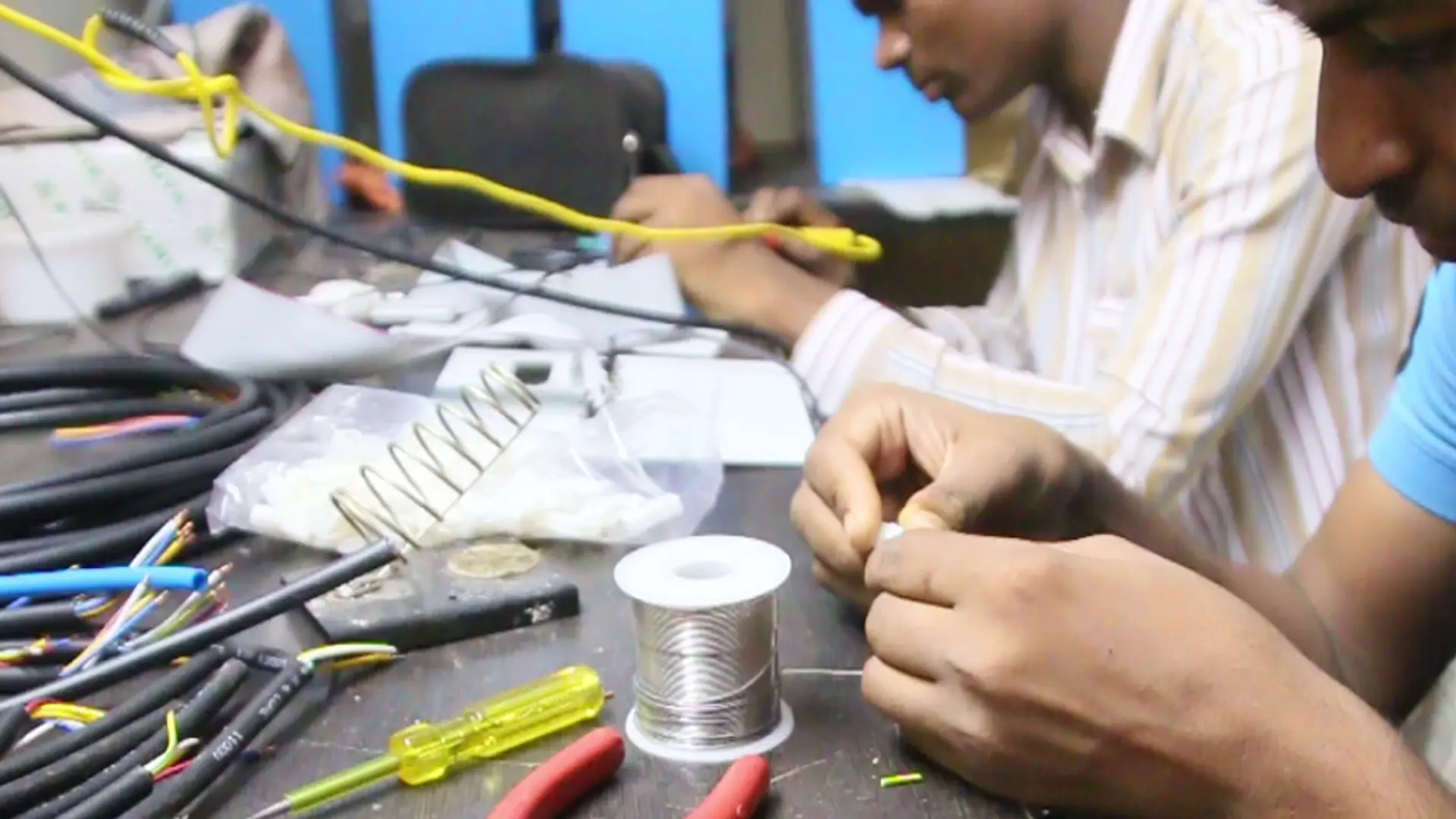India needs to have more zebra startups, not just a few unicorns: Naveen Jha, Sandbox Startups incubator
In this interview, Naveen Jha, the CEO of the Deshpande Foundation, India, and Hubbali Sandbox, takes a deep dive into the unique peer-powered entrepreneurship model of Sandbox Startups for Tier II cities in India.
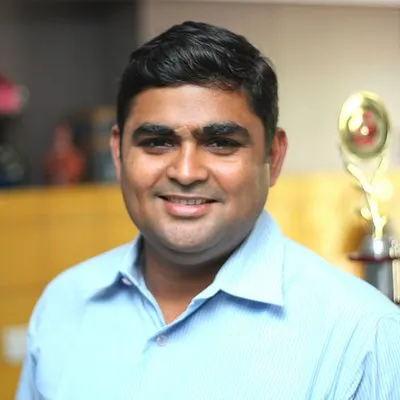
[This article is part of the YourStory series Startup Hatch, about incubators, accelerators, makerspaces and co-working spaces in the startup ecosystem. See earlier profiles of initiatives at IIT Bombay, IIM Bangalore, BITS Pilani, NCL, Tata Elxsi,Axilor, NID, IIIT-Bangalore, IIIT-Hyderabad, Vellore Institute of Technology, PSG Coimbatore, Workbench Projects, Makers Asylum, Appy Hours, Turning Ideas, NetApp Excellerator, Pitney Bowes Accelerator, TechStars, Indigram Labs, WeWork, Z Nation Lab, Ashoka Innovators, and Startup Leadership Programme.]
Naveen Jha is the CEO of the Deshpande Foundation, India, and Hubbali Sandbox. He has been with the foundation since its inception, with a vision of enabling local solutions through a bottom-up approach.
Launched in 2008, Deshpande Foundation’s Sandbox Startups provides incubation support to first-time entrepreneurs. It mentors aspiring entrepreneurs with a vision to create sustainable, scalable, and replicable business models relevant to Tier II cities in India.
Entrepreneurs with innovative small business ideas can enter Sandbox Startups either through its incubation programme Entrepreneurs-In-Residence, or by applying for a co-working space. Sandbox organises events such as Global Entrepreneurship Week, Development Dialogue, Startup Yodha, Entreprenation, Biz LaunchPad, and Lead Talaash.
Naveen is also President and Co-founding Board Member of the TiE Hubbali Chapter. He graduated from Brandeis University with a masters in international development and was the recipient of the Ford Foundation Fellowship.
In this interview, Naveen talks to us about the Sandbox vision, opportunities for founders in India, examples of graduated startups, and vision for growing the entrepreneurship movement in India.
YourStory: What was the founding vision of Sandbox Startups, and how is it being realised?
Naveen Jha: We wanted to create the secret sauce to build entrepreneurs in smaller towns and semi-urban India where they are closer to the problem. We are targeting self-driven entrepreneurs who can see and feel the problems and create prototype ideas that are scalable. We see that in Tier I cities most ideas are similar and work in a limited problem space.
Our aim is to enable mission-driven entrepreneurs who can tackle new sets of problems. Cities like Hubballi, Nizamabad, and Varanasi can create a new wave and culture of entrepreneurship in India. These cities have more resilient entrepreneurs solving new problems, and their middle-class upbringing is providing just the right ingredient for making a unique recipe to build more scalable and impactful enterprises.
This is the secret sauce that we have decoded. The Sandbox ecosystem provides a place for the catalysts to test ideas, make changes and eventually develop truly scalable solutions. The entrepreneurs collaborate with each other and that's one of our biggest strengths. We encourage this peer learning culture and the different startups help each whenever they face problems.
I don’t know how many Bangalores we can create in the future but we can surely create 300-400 Hubballis in India. This also provides us with a unique opportunity to come up with new ideas to build products and services for 90 percent of Indians. The Bengaluru or the Silicon Valley model cannot be replicated globally, but the Hubballi model is scalable and can be implemented anywhere.
The Silicon Valley model is meant to cater to just 5 percent of the world’s population. We help create entrepreneurs who build solutions for the 70 percent of the world’s population, and with a high success rate.
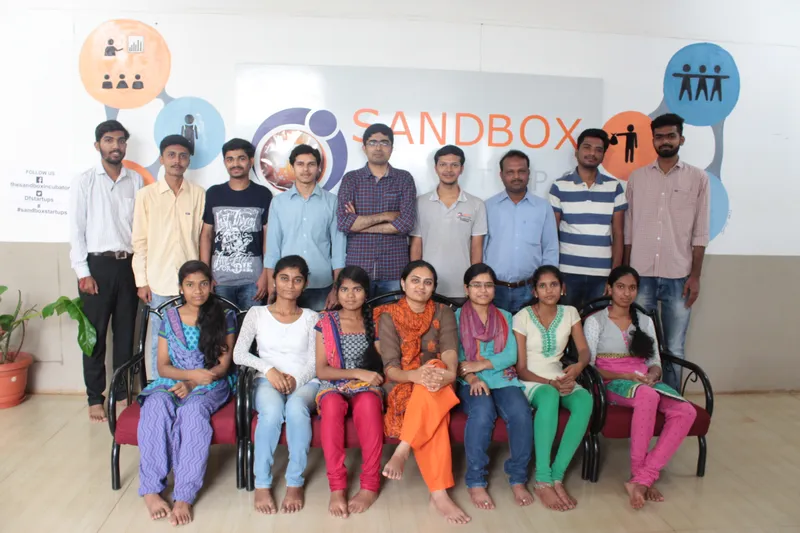
YS: Is your model closer to an incubator or accelerator, or a hybrid?
NJ: The Sandbox Startups in Hubballi has a long way to go to further fuel the startup ecosystem in the region; this is just the start. The success that we have achieved here gives us a lot of joy and some of the companies that we have incubated here have made it big.
There’s a variety of solutions that we are trying to create here. We are playing a pioneering role in creating an innovative entrepreneurship model. Basically, we are not just an incubator or an accelerator or a hybrid. Not being sure about this compartmentalisation is the best way to move ahead; we need to decode our own model and perspective to develop. We do not want to limit ourselves to the give-and-take process and typical real state proposition. We want to focus more on value creation for entrepreneurs.
We, in Hubballi, made a conscious choice to create value for each other. We have ingrained various processes and build engagement with each entrepreneur. The best part of our evolving system is that peers help each other. The neighbouring entrepreneurs are helping each other to grow and, so, collective growth is taking place here.
Our main aim is to create a culture where entrepreneurs are helping each other. Peers’ feedback plays a critical role during the early days. Experts can give you mentorship and inspiration, but it is hard for them to be relevant at that particular time.
Inspiration is important, but just pure inspirational talks won’t suffice. Your peers who are in the same boat can help you tackle your needs much better.
YS: What are the key challenges faced by startups in India and how would you bridge the gap?
NJ: In India, there’s a perceptible buzz around startups. We should create more exposure to the startup ecosystem. People come here with the belief that they can start making money in a month or so, which is not the case. India is a young economy and we need to create awareness among youth about startups.
Another aspect is that we should promote a variety of ideas and not just similar kinds of ideas. India is an open economy; it’s not like China. We have to look into our challenges with a new perspective and work according to our needs. RedBus, founded by Phanindra Sama is a prime example of this.
In the West, they only speak about hotels and flights when they speak about travel plans, whereas in India the scenario is different. Buses are an integral part of our travel plans, and Redbus was the first to grasp this local opportunity and turn it into a successful venture, which others are following.
This is all about local problems and providing solutions for them. The problem with budding entrepreneurs in India is that their vision to scale is limited. If they reach Rs 5 crore revenue, they are happy and comfortable. They don’t want to think big.
We need more conviction and belief that a Rs 1,000 crore business can be built; we need to think big. I see this as a big bottleneck. In addition to mentorship, we need enterprise benchmarking. If we can create two or three more examples of “big” success stories, it will help others to think big and achieve more.
YS: How is the entrepreneurial culture at Sandbox different from others?
NJ: The entrepreneurial culture here is different from what you see in other bigger cities. In a city like Bengaluru, there are too many disturbances and noises. People are mostly distracted and they are in a hurry to reach somewhere. Most startups are misguided by various terms like Right Time, Right Place, and Right Person; Hockey-stick curve; S-curve; and so on.
Even if it happens, you will only come to know about it in hindsight. I believe that bigger metros are creating noise and clutter that is distracting entrepreneurs. In contrast, the entrepreneurs here can focus and concentrate on their work. They are away from all the distractions and clutter.
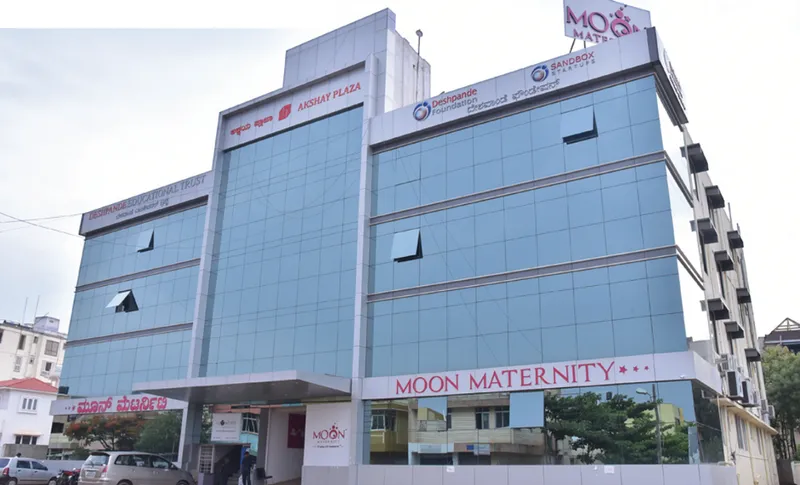
YS: What are your selection criteria for startups?
NJ: We are sector-agnostic and do not make any judgement on ideas. We are even fine with individuals who have no ideas but are passionate about solving problems and want to explore. We don’t want to be in the process of selecting winners or losers.
We are the game promoters. We want to facilitate the process of playing the game. We would like to have more and more people play the game. The most important thing is that we have peer entrepreneurs who form the real secret sauce. The entrepreneurs here get inspired by each other and work together to achieve something unique.
When something is not working for them, they join others; this creates a new life in the ecosystem. There have been cases here when even after creating separate spaces for incubatees, they want to be with others because of the vibrancy of the place.
We started this place with the concept of Entrepreneurs-in-Residence (EIR). The EIR programme started in 2008 to help first-time entrepreneurs make their dreams come true. Entrepreneurs-in-Residence as a thought is more empowering; it helps entrepreneurs learn from each other and watch each other grow. I really believe that India needs the Entrepreneur-in-Residence model.
A typical saying in Silicon Valley is that startups start in garages. They are just not worried about other things. They believe in their idea and keep working towards it. Our place is more like an entrepreneur school. It is a different way of running the business. It’s more about focusing on the business and the work at hand.
YS: What are the facilities and services for startups at Sandbox Startups?
NJ: Many young minds in India's semi-urban areas have extraordinary capabilities and entrepreneurial skills. We are setting up the Electronics System Design and Manufacturing (ESDM) facility, surface-mount technology (SMT) line, and 3D printing line. We need to create a culture of manufacturing things.
We can take the example of drones. People started making drones just for fun, but now they can do a whole lot of things. From surveillance to carrying payloads, you name it and they can do it. There has been mind-blowing progress. And all this happened because they have this inherent culture of making and designing new things.
We have to create the right infrastructure to use facilities and create new things. We have a long-term vision and we are integrating these capabilities. Sandbox Startups is positioned as a living laboratory for entrepreneurs to test and launch their ideas. With an ecosystem that comprises seed funding, co-working space, mentoring, network support, technology assistance, go-to-market strategies and much more, Sandbox Startups has enabled close to 300 aspiring minds in semi-urban and rural regions to turn their entrepreneurial dreams into reality. We provide tech support, makers lab facilities, direct funds, mentoring in sales and operations, access to partner networks, and admin support.
This has helped expand the country’s startup horizon beyond bigger cities where a majority of impact incubators are located. Creation of job opportunities and revenue generation by enterprises supported by Sandbox Startups is positively impacting the local economy and encouraging more problem-solvers to take to entrepreneurship.
YS: Which startups have graduated from Sandbox so far?
NJ: Currently, there are 34 startups under incubation at Sandbox. More than 60 companies have been incubated so far. A new facility that can accommodate about 100 startups will be opened later this year. Here are some of the notable startups that have successfully graduated from the Sandbox.
Nanopix (founded by Sasi Sekar Krish) is an image processing and industry automation company targeting sectors such as sports, industry controls, biotechnology, and security industries. It has a team of experts that designs and develops algorithms at an abstract level and converts them into applications in various fields such as bioinformatics and VLSI. Its current mandate is to increase the ability and efficiency of agriculture processors in grading and selling high-quality produce through an automated process. The first application of this technology has been for the cashew industry.
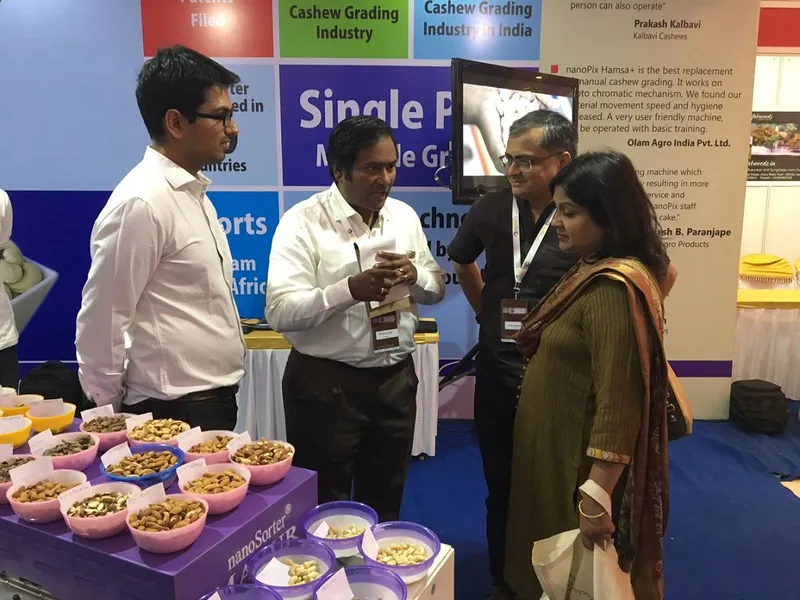
AqauSafi Purification Systems (founded by Satvik Sarwade in 2011) provides clean water systems, training and services to underserved communities in developing countries. They use reverse osmosis technology to tailor the system to the local water quality. The water is softened while harmful bacteria and excess chemicals are removed, rendering the water healthier.Instead of directly selling the water themselves, filtration units are sold to entrepreneurs in villages, NGOs and gram panchayats. This allows the company to compete in terms of costs, as there is no operator expense for the company. Typically, bottled water is sold at Rs 15 per litre, while an AquaSafi unit is able to provide water at Rs 0.10-0.20 per litre. The organisation has implemented over 30 of these units in rural regions across Karnataka and has 11 employees. AquaSafi’s team has over two decades of experience and several patents on water purification in the US.
Safe Hands 24×7 (founded by Shravani Hagargi) provides quality security and housekeeping services to a multitude of clients throughout the Karnataka region, securing jobs for a growing force of both men and women. Recognising a gap in the market and a strong need for female security guards, SafeHands was founded in 2009. Since then, it has grown to provide both male and female security guards, as well as other services such as gardening, plumbing, and painting. Providing a sustainable livelihood and an escape from impoverished lifestyles, Safe Hands also promotes gender equality and the importance of female independence in the workforce. It started with nine employees and has grown to support over 300 employees, 60 percent of whom are women. Its revenues are Rs 1.5 crore annually (2013), and it is now a fully profitable and independent venture.
Art Waley (founded by Priyal Ostwal) is a marketplace for paintings, with a hybrid model of online sales as well as offline retail. Founded by artist-entrepreneur Priyal Ostwal, it enables local artists to sell their works to connoisseurs across the world. Art Waley aims to provide a level-playing field to lesser-known artists engaged in high-quality work.
Freshboxx Ventures (founded by Rohan Kulkarni) is an ecommerce startup that delivers farm-fresh, chemical-free fruits and vegetables straight from farmers to consumers, eliminating the middlemen bottleneck. It caters to customers in cities like Hubballi that are not the focus of big ecommerce players. Freshboxx has built a network of farmers, procures farm produce directly from them, and delivers orders received online, via phone calls or messages.
Navodyami (founded by Neelam Maheshwari in 2011) makes authentic ethnic crafts available at the doorstep of customers. Gearing up to be the “Flipkart for Crafts”, the company leverages an ecosystem of 4,000 artisans from several states. Assured quality, reasonable prices, and a robust delivery arm ensure customers with a liking for regional ethnic crafts can purchase them anywhere, anytime. Artisans get better returns and inspiration to scale up their business further.
Linkez Technologies (founded by Divyesh Kumar Shah) leverages IoT technology to deliver innovative solutions for the connected industry. Different industry verticals need to exchange multiple types of data with their peers and vendors. The company provides technology needed by enterprises to achieve seamless exchange of data in a secure and stable environment. It enables companies to be smarter, more efficient, and productive.
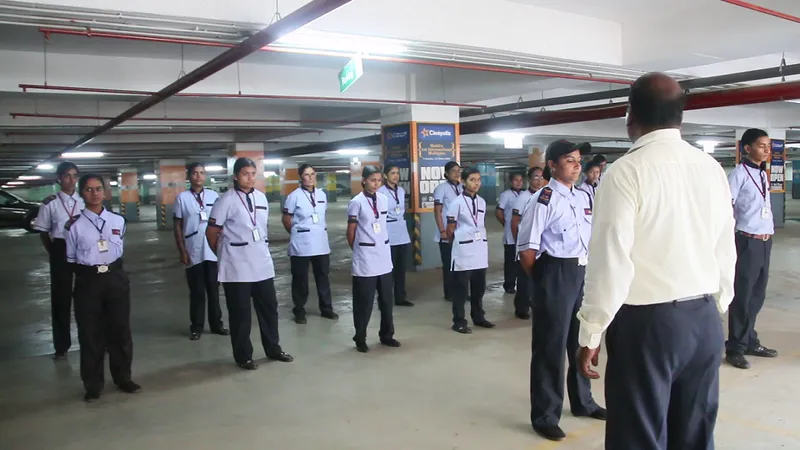
YS: What kinds of IP are being created by your startups?
NJ: We are very glad to say that we have over 50 IPs awarded. We got one American IP approved. Another IP is also coming, which will have a potential of Rs 50 crore business value. It is in the technology space.
People create IPs for academic and business purposes. But now things are changing and your IP itself is a big business advantage.
YS: What is the profile of the managers of Sandbox?
NJ: We are ably assisted by Sunilkumar S. K (Technical Advisor), Amrut Patil (Manager), Meghana Morey (Lead, Community Building), Siddu Parannavar (Admin), Raju Mudhireddy (Lead, Social Media), and Sharanu Mugali (ITManager). We have over 30 mentors, including Dr Gururaj ‘Desh’ Deshpande, Hemang Dave, Phanindra Sama, Neelam Maheshwari, Raj Melville, David Parker, Rema Subramanian, Kumar Ramachandran, and Shravani Pawar (see full list here).
YS: What would you define as success for Sandbox?
NJ: We are able to play the role of facilitators, motivating more and more people to play this game and explore entrepreneurship. The idea of success would be to see who is there for two to three years and how these guys scale it up.
The number of entrepreneurs who can join us and play the game is the key factor and this brings in energy to the whole entrepreneurial space. The next thing that will define success is that the existing entrepreneurs take it forward and move to the next level.
YS: How do you compare and contrast India’s incubators and accelerators with those of other countries such as the US and China?
NJ: US and China have moved on and are in a league of their own. They are experimenting with different things and moving ahead at a rapid pace. In the US and China, the startup ecosystem is more vibrant.
In the US, the private sector is very actively involved with the process and we also need to do the same in India. Industries need to come forward and get involved. Tons of startup accelerators in the US are facilitating thinking “big” and spending “big”.
In China, you have many incubators and they are more aggressive in their approach. The entrepreneurial culture in China is not only tech-based. Their diversity is huge. They have created a lot of small entrepreneurs. India and China will have the edge in creating mid-size entrepreneurs.
It’s all about asking yourself whether you want a few unicorns or more zebras. India and China have to focus on more zebras; we have the potential to create a lot of zebras.
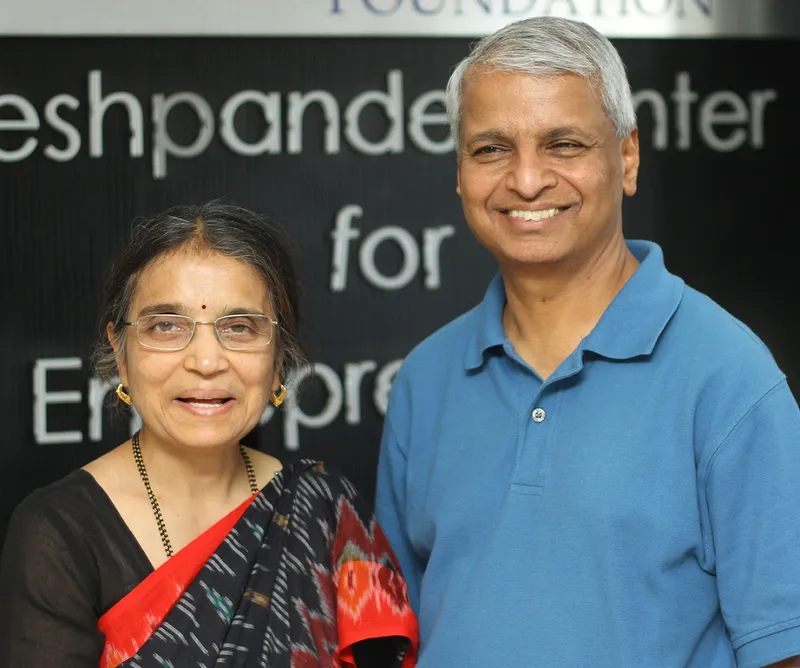
YS: What partnerships do you have with academic and research institutions?
NJ: We have academic and non-academic partnerships with local engineering colleges, Microsoft, Department of Science and Technology (DST), and Zoho among others. This has helped us give the Sandbox more structure.
With DST, we received encouragement to set up a huge incubation centre and the Government of Karnataka came forward to strengthen our mission. They supported the setting up of an ESDM facility at Hubballi. I am sure that, within five years, this will be the most happening place giving budding entrepreneurs the right ecosystem to develop a whole array of innovative ideas.
YS: What are some of the challenges Sandbox startups face?
NJ: For most young entrepreneurs that I have come across, convincing their families to leave their jobs and start something new has been the most difficult part. Having said that, things are changing as families and peers are now becoming more understanding and accommodating.
I also believe that we need to simplify our legal structure and make the setting up of business hassle-free.
YS: What are your recommendations for Indian policymakers to make business easier for incubators, accelerators, investors, researchers, and startups in India?
NJ: In India, things are a bit complex. The authorities have placed so many checks and balances that the whole thing becomes very cumbersome. We need to get rid of all the roadblocks. Banks are also unwilling to support at the start. There’s no financial support at the beginning which is so essential.
The government is trying its best and making all the positive announcements, but it’s still at a slow pace. We are yet to reach the tipping point; various stakeholders need to expedite the whole process. They should identify incubators and help them grow rapidly. We need to evolve various forms of venture formations.
Another aspect that is equally important is arranging fund at the angel level. We need to provide help (in the range of Rs 10 lakh to Rs 20 lakh) to budding entrepreneurs so that they can go ahead with their ideas and build prototypes. There’s no dearth of ideas in our country and we can have multitudes of ideas on the table at the proof-of-concept level. The market is ready to take over after that.
We also need to simplify the process of applying for tenders for government projects. Now, it’s very difficult for startups to fulfil the eligibility criteria, which are heavily in favour of the big corporates. The onus is on the government to provide a level playing field for startups.
We also need to create marketing opportunities for the startups. We don’t have a shortage of young people or ideas. It’s just that the whole process needs a small impetus and help from the government. The government can help by designing various instruments such as tax incentives to startups to help them move forward.
YS: What are your plans for the coming three to five years with respect to new startups?
NJ: I would like to see how the entrepreneurial ecosystem in India can grow in smaller towns and contribute in making them a happening place when it comes to the entrepreneurial ecosystem. This means attracting a lot of young entrepreneurs to come, play and explore opportunities in various fields. It is really fun working with entrepreneurial people.
The Sandbox model is being adopted by philanthropists in different parts of the country such as Telangana (Nizamabad, Nalgonda) and Uttar Pradesh (Varanasi). Each of them is run independently, but some experiences and learnings are shared.
YS: What additional challenges are faced by social entrepreneurs as compared to tech/business founders?
NJ: There’s not much difference, only the motivations are different. In a social enterprise, you need to be compassionate about people and your priorities are different. There’s no exit when you are working for a social enterprise. You can never exit from your compassion. Compassion is the only reward that you have at the end of the day working for a social enterprise.
In India, social entrepreneurship still needs much more encouragement. There is no support system. Also, your beneficiary has a different thought process than what you have. It’s more like the coming together of two different worlds. It’s like the culmination of two different cultures, further complicated by the structural issues.
YS: What are your recommendations or words of inspiration to startups and entrepreneurs in our audience?
NJ: Don’t give up early. Don’t believe in “Fail Fast, Fail Early”. Those who come from a middle-class background are resilient and run the long marathon of entrepreneurship until they achieve success. Failure shortens the learning curve and you need to come back from failure to emerge as winners.
If you believe that something is worth a try, don’t give up. Make consistent efforts and be persistent. India is a very tough market, but you have to act fast and you should not get trapped in the “hockey curve” and other such fancy management jargon.


